Ragdoll cats are adorable, furry, affectionate, and easy to love. However, they are also one of the more expensive breeds. It’s vital to ensure that you have the patience and time to take care of a Ragdoll kitten and that you are also financially secure enough to afford to take care of one of these cats. Although adopting a cat is one of the highest costs of pet ownership, there are several other expenses you’ll have to consider.
We’ll break down the Ragdoll cat price for you in the guide below so you can decide if you have what it takes to give this adorable feline a forever home.
Bringing Home a New Ragdoll Cat: One-Time Costs
You probably already know that the highest one-time cost for a Ragdoll kitten is the adoption price. Ragdoll kittens are in high demand, which, unfortunately, raises the price. A reputable breeder can sell you a Ragdoll kitten for around $1,000, but show-quality Ragdoll kittens can cost over $2,000. Before adopting from a cattery, research the breeders in your area thoroughly to determine if their facilities are sanitary and if the breeding practices are sound. If a breeder charges a few hundred dollars for purebred Ragdolls, it’s best to look elsewhere. A low price often indicates that the breeder has not provided the best care for its cats.
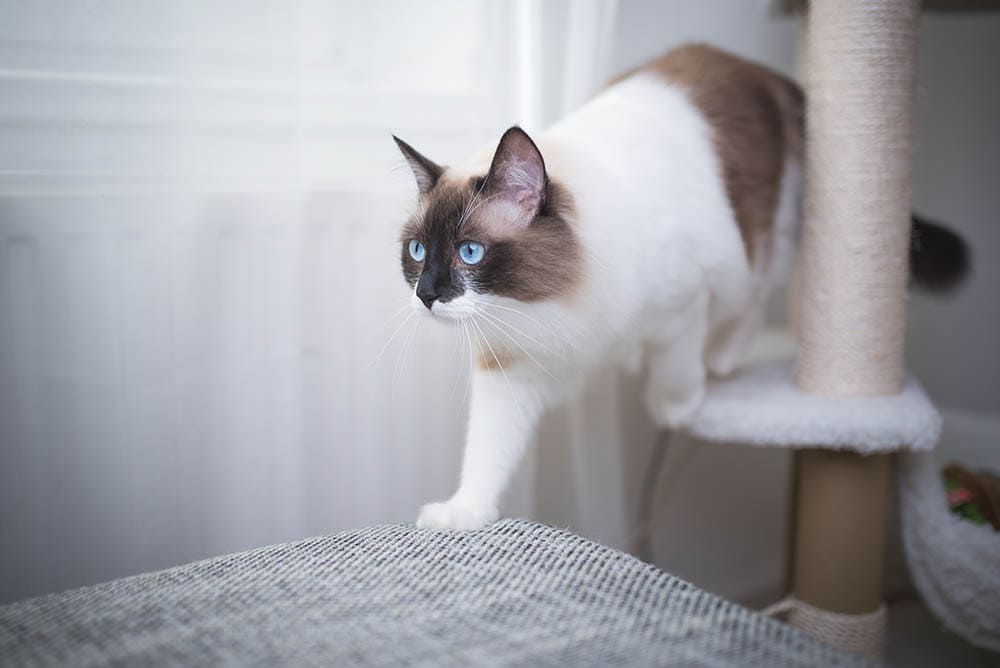
Free
It’s very rare that you’ll find a Ragdoll for free. However, you’re welcome to keep looking, and possibly you’ll get lucky. Sometimes, an owner will put their cat up for adoption when they realize they cannot properly care for them. Or maybe a friend or family member can no longer take care of the cat, and they reach out to you to take them.
Adoption
- $400 to $1,000
If you can find a Ragdoll cat at a rescue or pet shelter, you can expect to pay $400 to $1,000 to adopt it. These cats aren’t put into shelters very often, and when they are, people adopt them quickly, so you must act fast. The adoption fee often includes vaccinations, microchipping, and deworming.
Breeder
- $1,000 to $2,500+
If you can’t find someone giving away a Ragdoll cat or find one to adopt, the next choice is going to a breeder to purchase one. If you find a reputable breeder, and it’s extremely important that you do, the average ragdoll cat price will run you anywhere from $1,000 to $2,500 to purchase a Ragdoll kitten.
Before adopting from a breeder, ask them if you can visit the cattery. Meeting the parents can help you determine if the offspring are well-cared for and healthy, and you can inspect the property to ensure it’s clean.
Initial Setup and Supplies
- $870 to $1,685
Once you’ve paid the breeder or rescue center to bring home your Ragdoll kitten, there are a few things you’ll need to purchase first. You want your new feline friend to feel comfortable, safe and loved in your home.
These initial supplies will include a cat bed, food and water dishes, microchipping, vaccinations, food, toys, and numerous accessories.
At the very least, you’ll need food and water dishes, food, ID tags, a collar, and vaccines. However, as a responsible pet owner, you will want to have your cat spayed or neutered and microchipped. The prices below will vary depending on where you live.
List of Ragdoll Cats Care Supplies and Costs
| ID Tag and Collar | $35 |
| Spay/Neuter | $50 to $250 |
| X-Ray Cost | $150 to $250 |
| Ultrasound Cost | $250 to $550 |
| Microchip | $45 to $55 |
| Teeth Cleaning | $150 to $300 |
| Bed/Tank/Cage | $60 |
| Nail Clipper (optional) | $7 |
| Brush (optional) | $8 |
| Litter Box | $25 to $30 |
| Litter Scoop | $10 to $15 |
| Toys | $30 to $45 |
| Carrier | $40 to $55 |
| Food and Water Bowls | $10 to $25 |
How Much Does a Ragdoll Cat Cost Per Month?
- $265 to $750 per month
Once all of the one-time costs are taken care of, it’s time to start thinking about how much is a ragdoll cat per month. It takes quite a bit of money, time, and patience to keep a cat healthy and happy.
Ragdoll cats, just like any other animal, are a lifetime commitment when you give them a forever home. To save money, you can look at pet product websites for coupons, and you can often receive a discount by contacting the company and filling out a survey.
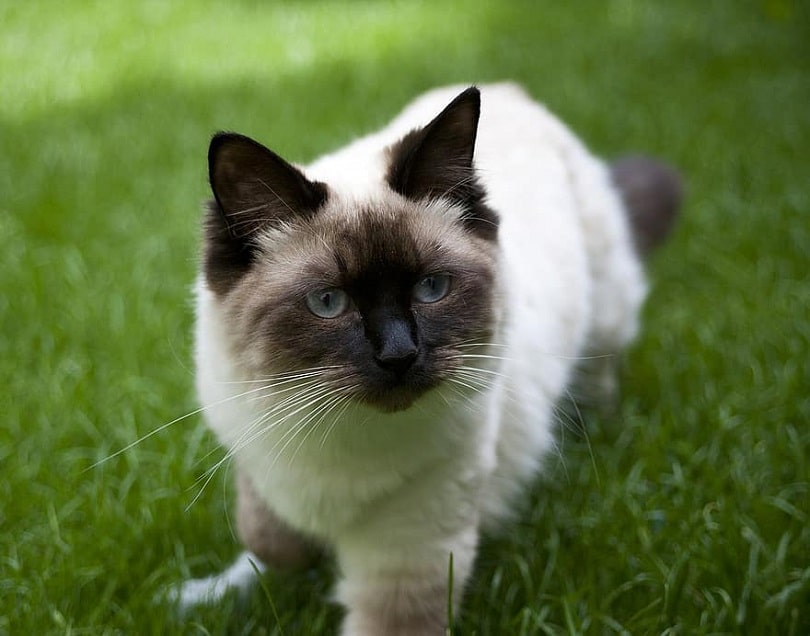
Health Care
- $0 to $805+ per month
If you’ve purchased or adopted a perfectly healthy Ragdoll cat, your monthly healthcare bills should be pretty cheap, if not non-existent. Cats with known health issues can get expensive when it comes to healthcare prices.
It’s common to pay over $250 a month in healthcare-related costs if your Ragdoll is sick or getting older. You can ensure your Ragdoll stays healthy with the proper food, grooming, and yearly trips to the vet for checkups. We’ll break down the costs of each of these things by the month below.
Food
- $50 to $100 per month
Food is going to be one of the biggest expenses, as you must feed your Ragdoll cat high-quality cat food to keep it healthy. Ragdoll cats are very active, so they love to play, and they tend to be bigger than some other domestic cats, so you’ll have to spend between $50 and $100 a month for high-quality, protein-filled food.
You can save money on pet food by joining a subscription club that discounts its regular prices when you order every month. Chewy has one of the highest-rated subscription services, and its customer service is excellent.
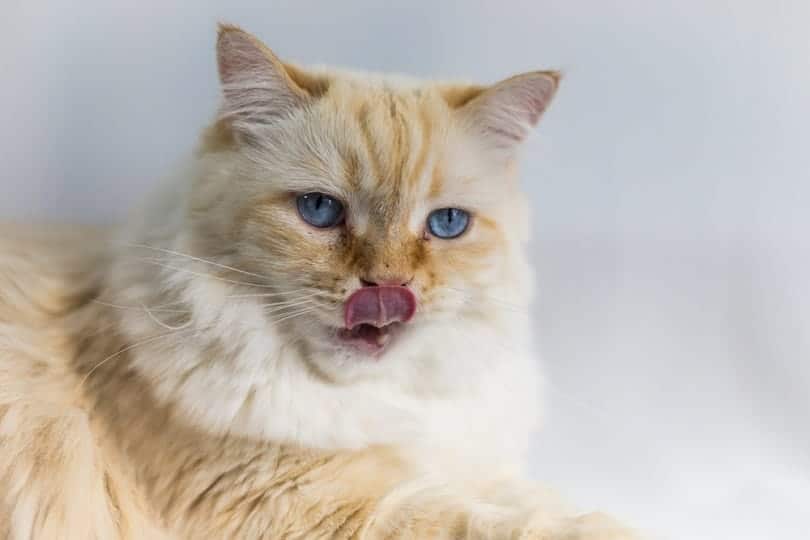
Grooming
- $30 to $50 per month
Ragdoll cats are considered high-maintenance cats due to their high grooming needs. You can expect to pay for your cat’s nail clipping, fur maintenance, and dental care. This will probably run you between $30 and $50 a month, which isn’t as bad as some of the other costs on our list.
Remember, this is the cost if you groom your cat at home. Taking your Ragdoll to a professional groomer will cost you quite a bit more.
Medications and Vet Visits
- $100 to $200 per month/visit
If your Ragdoll is healthy, it will not cost you $100 to $200 every month for vet visits and medication. You’ll pay a similar amount every year if you take your cat to the vet, but your monthly costs will be relatively low. Ragdolls that suffer from health conditions will require higher monthly payments to the vet, and the cost of medications and treatments will also raise the prices.
Pet Insurance
- $25 to $50 per month
You can expect to pay anywhere from $25 to $50 monthly for a good-quality pet insurance plan. This, of course, depends on the pet insurance provider you choose to purchase your policy through, the age and health of your Ragdoll cat, and your location.
While many pet owners don’t feel that pet insurance is necessary, especially for a perfectly healthy cat, the cost, if that cat gets sick or is injured in some way, is a lot more expensive than $25 to $50 per month.
However, if you decide that pet insurance isn’t something you want to invest in for your Ragdoll, set aside funds for the unexpected so you’re covered if the worst should happen.
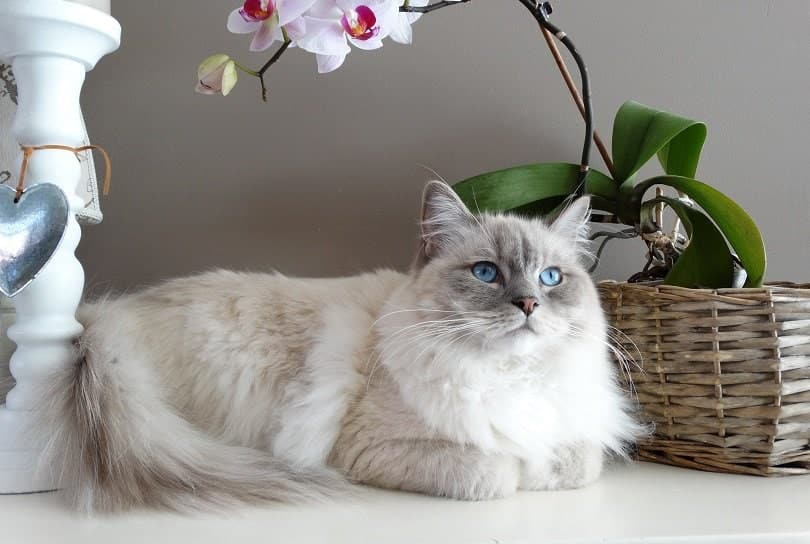
Environment Maintenance
- $30 to $95 per month
If you want your Ragdoll cat to remain healthy, the cat needs a healthy environment to thrive. You should purchase litter box liners, quality litter, deodorizing spray, scratching posts, and a comfortable cat bed.
You can expect these items to cost you between $25 and $90 a month, depending on the brand you buy and how many cats you have. The litter will be your biggest expense for environmental maintenance for your Ragdoll feline friend. Changing the cat litter goes a long way, but replacing it keeps your cat healthy and happy and your home smelling fresh.
| Litter box liners and litter | $15 to $50 a month |
| Deodorizing spray or granules | $5 to $25 a month |
| Cardboard Scratcher | $10 to $20 a month |
Entertainment
- $30 to $60 per month
Of course, you want to keep your feline pal entertained since they need mental and physical stimulation. You can buy cat tunnels, cat towers, food puzzles, toys, and treats.
There are also cat subscription boxes that you can subscribe to that will send you a box of toys for your cat for a monthly fee. You should expect to spend between $30 and $60 a month for entertainment for your Ragdoll either way, whichever route you choose.
Total Monthly Cost of Owning a Ragdoll Cat
- $265 to $805+ per month
As you can see, purchasing a Ragdoll cat and taking care of it can be an expensive endeavor to undertake. The cost of keeping your cat healthy, happy, and feeling loved is $265 to $805+ a month, depending on where you live and the stores you frequent.
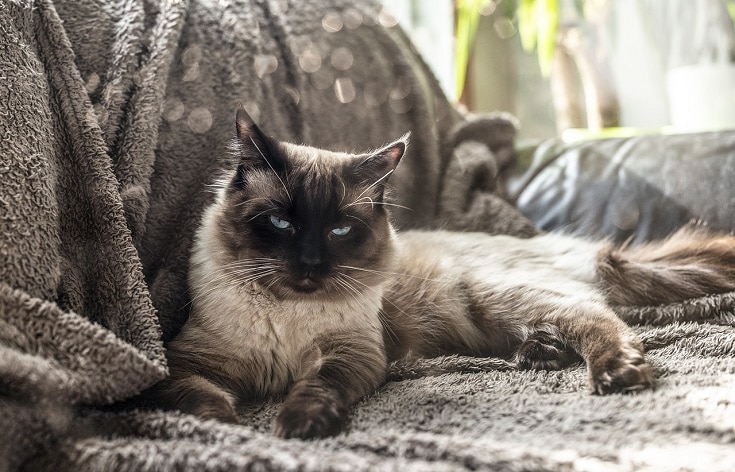
 Additional Costs to Factor In
Additional Costs to Factor In
There are a few other costs that you’ll want to factor in when it comes to caring for your Ragdoll cat. For example, if you travel on business or often go somewhere that your Ragdoll can’t go, you’ll want to factor in the cost of having someone pet-sit your feline.
If you intend to show your cat, you’ll need to pay extra for training and hotel rooms. Also, if you get your Ragdoll as a kitten, as most pet owners do, you’ll need to factor in the costs for repairs to your household and furniture, as kittens have a habit of sharpening their claws on any and everything.
With that being said, Ragdoll kittens learn quickly to avoid scratching the furniture, and most have no issues using the litter box, so it won’t be long until your kitten exhibits less destructive behavior.
Owning a Ragdoll Cat on a Budget
Though it may be tempting to cut corners when it comes to taking care of your cat, you have to remember that the more corners you cut, the more you may end up paying in the long run. You can save money by grooming your cat at home and looking for coupons and discounts for food and supplies, but it’s difficult to reduce your expenses for veterinary visits and medications. Taking your cat for veterinary appointments and providing quality food is vital, but if you avoid going to the vet and properly caring for your pet, your expenses will increase significantly.
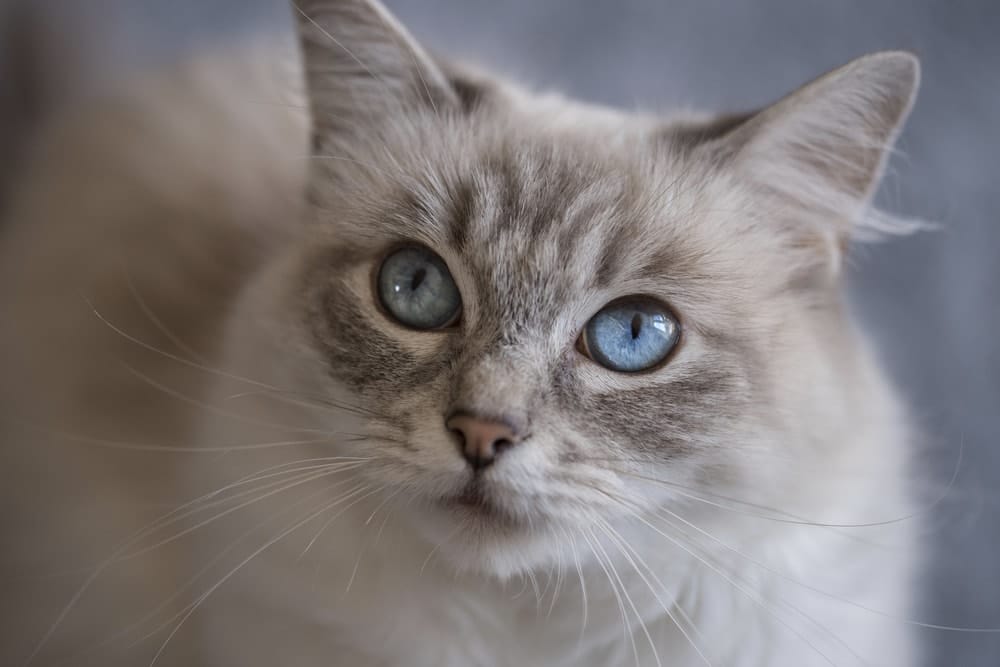
Saving Money on Ragdoll Cats Care
The best way to save money on Ragdoll cat care is to budget and spend your money wisely. For example, spending money to buy the best quality food for your Ragdoll may seem expensive, but it’s less expensive than paying the vet bill should your cat become sick. You can also use coupons, as they are easy to find online and even in the Sunday paper.
Conclusion
Ragdoll cats are not only expensive to purchase or adopt, but they are also expensive to take care of. So how much do ragdoll cats cost? You should expect to pay over $1,000 for your Ragdoll cat from a reputable breeder. It’s important to note that any cat is going to be costly in terms of food, vet visits, cat boxes, and cat litter. While Ragdoll cats are more expensive to purchase than most other breeds if you can afford it and watch your money, you will be more than happy that you chose to give this cat a forever home, and they will return your love in spades. Ragdolls are loyal, loving, gorgeous cats that any cat owner would be lucky to own.
See also:
- How Much Does It Cost to Own a Savannah Cat? (Price Guide)
- 11 Amazing Ragdoll Cat Facts: Surprising Things You’ll Love to Learn
Featured Image credit: madeinitaly4k, Shutterstock
Contents
- Bringing Home a New Ragdoll Cat: One-Time Costs
- How Much Does a Ragdoll Cat Cost Per Month?
- Health Care
- Food
- Grooming
- Medications and Vet Visits
- Pet Insurance
- Environment Maintenance
- Entertainment
- Total Monthly Cost of Owning a Ragdoll Cat
- Additional Costs to Factor In
- Owning a Ragdoll Cat on a Budget
- Saving Money on Ragdoll Cats Care
- Conclusion

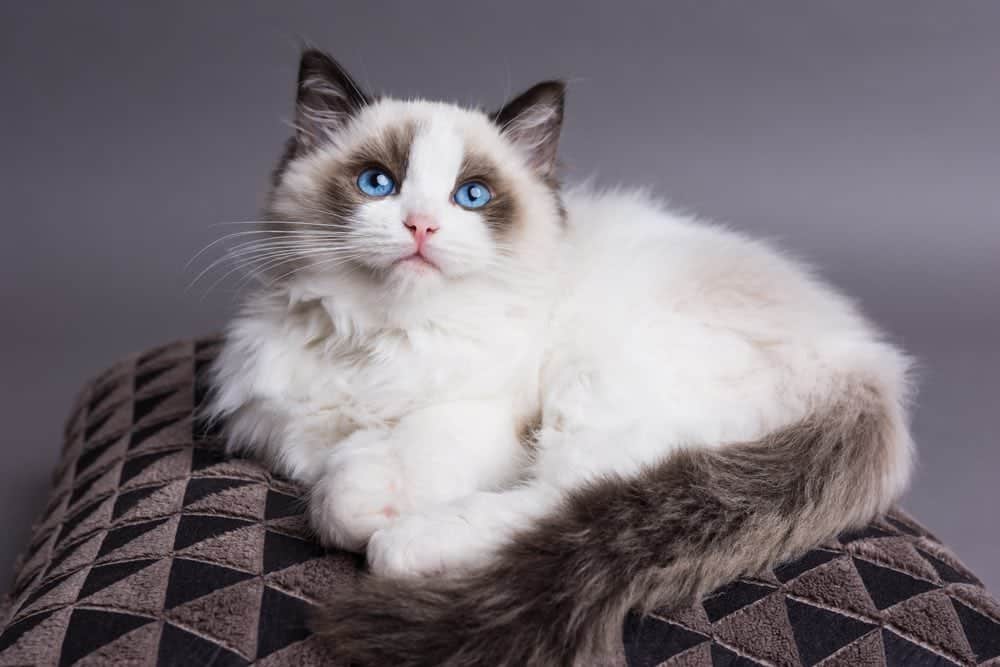
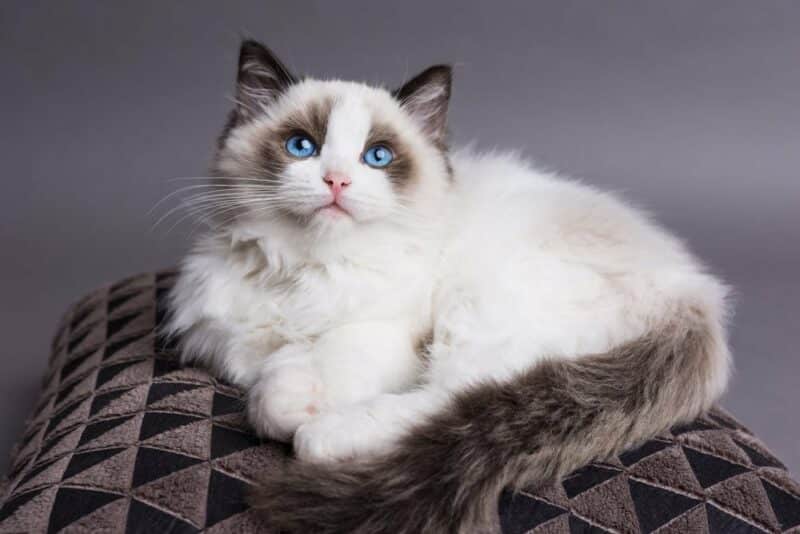

 Additional Costs to Factor In
Additional Costs to Factor In






